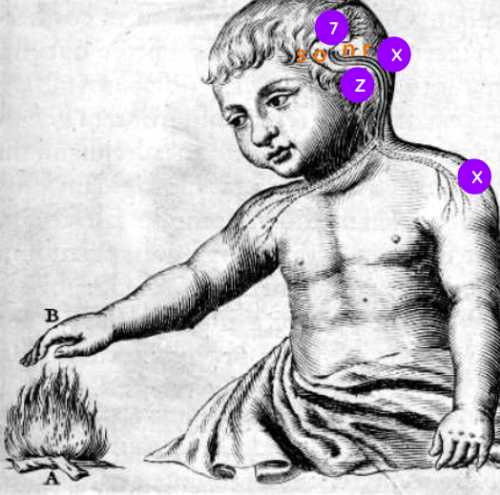The Disposition of the Filaments
Table of Contents
The disposition of the filaments composing the brain’s substance is either acquired or natural.
The acquired one depends on all other circumstances that alter the course of the spirits.
The Natural Disposition of these Filaments
These filaments have channels and pores to convey the spirits which are agitated by a peculiar force* into all the nerves that they go to.
Superphysics Note
In this way, the spirits can excite the same motions in the body such as those arising from our instinct.
For example, when fire A burns hand B, it causes the spirits that enter tube 7 and go towards O.
- They find 2 principal pores and ducts,
o, rando, s.

o, r conveys them into all the nerves that move the external members that is needed to avoid the fire by:
- retracting the hand, arm, or the entire body
- moving the head around and direct the eyes towards the fire
But through another duct, o, s, the spirits pass into all those nerves which serve internal movements, similar to those which follow pain in us.
These contract the heart, agitate the liver, and similar others.
Likewise, into those nerves which can produce those external movements by which these internal movements are signified: as into those which induce tears, which furrow the brow and cheeks, and which prepare the voice for wailing.
But if hand B were not burnt by fire A but only moderately warmed, it would cause the same spirits that enter through tube 7 not to tend towards O, but towards P.
There, they would again find pores to pass through into the nerves serving motions for this action.
I have not without reason distinguished two pores, o, r and o, s. Figure XLIX.
Namely, to remind you that almost always two kinds of motions arise from any action.
For external movements are excited, by which we pursue what we desire and avoid what is harmful.
The internal ones we commonly call “the principles of passions”. These dispose the heart and liver, and all the other organs on which the temperament of the blood, and therefore of the spirits, depends on. Those spirits they generate then become suited to excite external movements as required.
Different qualities of spirits are caused by one of those circumstances which changes their course.
For example, if some evil is to be avoided or overcome or repelled by force, to which the choleric passion inclines us, the spirits cannot but be agitated more unevenly and more vigorously than usual.
Conversely, if something must be avoided or borne patiently by dissimulation, to which fear inclines, a smaller quantity of spirits and less vehemence is required.
To produce this effect, the heart must be contracted, and the spirits must be spared, to preserve them for this work.
Similar reasoning must be applied analogically to other passions.
Other external movements do not lead to avoiding evil or obtaining good.
Examples are laughter or weeping.
These are merely testimonies of certain passions.
These only occur if some occasion arises. This is because the nerves through which the ingress of spirits occurs to create them are closely related to the nerves through which the spirits are received to excite passions, as is evident from anatomy.